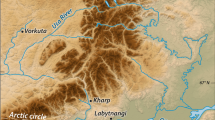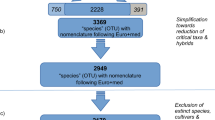Abstract
LAST summer (1891) I spent some weeks in Western Russia and Northern Germany, in order to ascertain whether the glacial fresh-water deposits of those countries contained any remains of the vegetation which lived there immediately after the inland ice had melted away. The results of my journey being favourable, I have thought it desirable to communicate them to the readers of NATURE; but before doing so it might be convenient to give a brief summary of previous investigations on the same subject.
This is a preview of subscription content, access via your institution
Access options
Subscribe to this journal
Receive 51 print issues and online access
$199.00 per year
only $3.90 per issue
Buy this article
- Purchase on Springer Link
- Instant access to full article PDF
Prices may be subject to local taxes which are calculated during checkout
Similar content being viewed by others
References
Petermann's Mitteilungen, 1889, pp. 282–290.
Engler's Botan. Jahrbücher, Bd. xiii., 1891, Beiblatt Nr. 29.
Rights and permissions
About this article
Cite this article
NATHORST, A. Fresh Evidence Concerning the Distribution of Arctic Plants During the Glacial Epoch. Nature 45, 273–276 (1892). https://doi.org/10.1038/045273a0
Issue Date:
DOI: https://doi.org/10.1038/045273a0
This article is cited by
-
Challenges in the presentation and analysis of plant-macrofossil stratigraphical data
Vegetation History and Archaeobotany (2014)
Comments
By submitting a comment you agree to abide by our Terms and Community Guidelines. If you find something abusive or that does not comply with our terms or guidelines please flag it as inappropriate.



